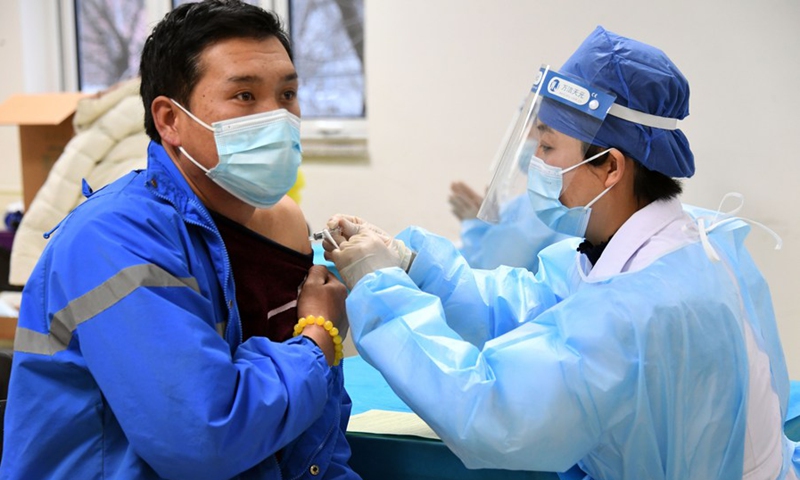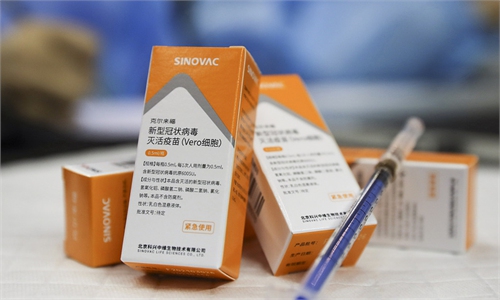
A medical worker inoculates a recipient with a COVID-19 vaccine at a temporary inoculation site in Haidian District in Beijing, capital of China, Jan. 11, 2021.(Photo:Xinhua)
China has administered about 200 million doses of COVID-19 vaccines as of Tuesday and 80 percent of medical personnel have been vaccinated, China's top health authority announced Wednesday at a press conference.
Mi Feng, spokesperson of China's National Health Commission, said China is continuously accelerating its vaccination drive and advised the public to take prevention measures amid rising international infections.
Shao Yiming, a leading expert advising on China's vaccine research and development, said at the press conference that it is possible that people have to receive COVID-19 vaccines annually to boost immunity, but whether it is necessary to do so requires further analysis.
Global authorities and vaccine producers have been collecting and analyzing data over the past half year. A final analysis of the data will decide whether it is necessary to receive vaccines against the novel coronavirus annually, like flu shots, he said.
Shao's remarks came amid growing doubts and discussions over COVID-19 vaccine efficacy in real life, as several leading global COVID-19 vaccine producers have said that a third shot or annual vaccination may be needed to maintain immunity against COVID-19.
US CDC revealed on April 15 that 5,800 Americans have caught COVID-19 and 74 have died from the virus out of 66 million who have completed vaccination. About 132 million Americans, or 40 percent of US population, have received at least one dose.
Shao said no vaccine can be 100 percent effective, and some recipients will get infected after vaccination. The most important thing is to prevent hospitalization, serious symptoms and deaths, against which most existing COVID-19 vaccines can be more than 80 percent effective.
The Chilean health authority released a report on the usage of Chinese company Sinovac Biotech's COVID-19 vaccine in the real world on April 16, which showed that the vaccine is 67 percent effective in preventing symptomatic infection and 80 percent effective in preventing deaths.
The Chilean government's report is based on data from more than 10 million recipients, making it the world's most complete dataset. It further demonstrated that China's vaccine is very effective not only in preventing infections, but also in preventing serious symptoms and deaths, Shao noted.
Shao also refuted reports from some foreign media that mass inoculation would accelerate coronavirus mutation and even lead to it escaping immunity, which makes the virus more infectious, fatal and difficult to tackle.
Virus mutations are always occurring, and the basis for the process is the replication of the virus. A virus has to continuously infect more people to replicate, and by cutting infections, people can cut replication and mutation, Shao said, noting that public health measures and vaccines are two major methods used to cut the infection chains.
Shao also noted that the immune system will attack coronavirus when a person is infected, which could prompt mutation within the body. If the person has been vaccinated, coronavirus will be less vigorous, replicate less, and be less likely to mutate, Shao said.
Mass vaccination also wins people time for research and development of adapted vaccines targeting mutated sequences, the expert said.
Global Times

